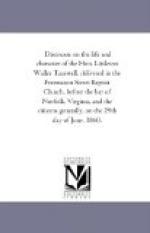Of most happy temperament, and without a particle of ostentation or parade, “his spirit was finely touched with the gentler virtues,” and those who enjoyed the privilege of his social intimacy will remember with delight the unaffected frankness and simplicity of his manners, the varied range, the breadth and depth and vivacity of his “marvellously rich and beautiful conversation,” whilst they must deeply deplore the loss of one as remarkable for mildness and the kindliest affections in his domestic relations, and all the intercourse of private life, as for profound thought and rare attainments.
It is not the purpose, nor is it within the scope of this brief memorial, to delineate the character of this eminent citizen. Clarum et venerabile nomen—“a fairer tribute shall one day grace his honorable tomb.” He belongs now to history.
SKETCH OF MR. TAZEWELL BY MR. SHARP.
This sketch appeared in one of the morning papers of Norfolk on the 8th of May; and though hastily written, deserves to be republished here. Mr. Sharp is the only member of the bar now living who was a student in the office of Mr. Tazewell, and who saw him closely while engaged in the two or three last years of his practice at the bar.
The mortal career of our celebrated townsman, LITTLETON WALLER TAZEWELL, closed on Sunday morning, at 11 o’clock. He was emphatically one of the great men of his age, and a just memorial of his life will, no doubt, be specially prepared in due season. Meantime, we will note, that he was born in the city of Williamsburg, where his father, Judge Tazewell, of the Court of Appeals, subsequently resided, on the 17th of December, 1774. After finishing his education at William and Mary College, he commenced his study of the law, partly under the care of his grandfather, Mr. Waller, and the late Mr. Wickham, of Richmond. He was distinguished at once at the bar as scientifically acquainted with his profession, the principles of which he drew, not from the labor-saving indexes of the present day, but from the pure and almost sacred writings of Coke and Mansfield. Such wells of truth were not sounded except by great intellectual efforts, and it is chiefly owing to the necessity which then existed of making such efforts, that we boast of the great lawyers of past times.
In a short time after his appearance in the courts he was elected to the Legislature, and was one of its members in the great session of ’98, when the resolutions prepared by Mr. Madison were introduced. The next year he represented the Williamsburg District in Congress, being successor to Judge Marshall in that body, and was present during the stormy period of Mr. Jefferson’s election to the Presidency over Burr. Few statesmen have more truly appreciated the grandeur of Mr. Jefferson’s teachings than did the subject of this notice.




